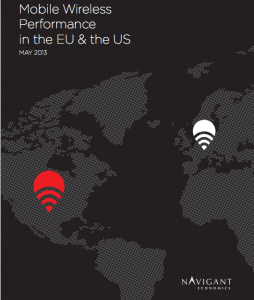 In the first quarter of 2013, European mobile revenues fell by 8.8 per cent year on year, making it the worst quarter on record. Since the beginning of the decade, European mobile service revenues have shrunk each quarter. As the European Commission deliberates about how to address this decline and stimulate investment, particularly in new broadband infrastructure, it might do well to look across the Atlantic.
In the first quarter of 2013, European mobile revenues fell by 8.8 per cent year on year, making it the worst quarter on record. Since the beginning of the decade, European mobile service revenues have shrunk each quarter. As the European Commission deliberates about how to address this decline and stimulate investment, particularly in new broadband infrastructure, it might do well to look across the Atlantic.
In the United States, mobile operator capital expenditure was 74 per cent higher in 2012 than in 2007, while in Europe, it had declined by three per cent. Little wonder then that 4G connections as a percentage of total connections are in the high teens in the United States, but have not exceeded the single digits in Europe.
These greater levels of investment are translating into faster data connections. Average speeds in the United States are now 75 per cent faster than in Europe, one reason why American consumers use twice as much data then their European counterparts and generate average revenues per subscriber of around $70 per month, more than $30 greater than the average in Europe.
The United Sates is outperforming due in some part to the market structure that enables operators to benefit from economies of scale and scope. In stark contrast, market fragmentation in Europe prevents such economies from being realised. Both Verizon and AT&T each have more subscribers than the three largest European operators combined. Fragmentation – 27 markets with different rules, license terms and timings of spectrum allocation – also limits consumer choice.
Regulation in the United States has clearly incentivised greater investment with firms seeking out competitive advantages where they can. The prevailing regulatory logic is that the mobile ecosystem is dynamic in nature and so intervention is not required to keep a firm’s advantage in check. Companies there are vying to offer consumers products with new and more valuable features, a process which includes making significant, and sometimes risky, investments.
In Europe, regulation has focused on a more static view of the market, one where firms compete but must do so on an equal basis, where consumer price deflation is the primary goal. Sure enough, today operators in some European markets are pricing below the cost of providing the service. This is simply unsustainable.
If the European Commission is to reverse this situation, it needs to review both competition and regulatory policy.
Increasing the number of competitors in dynamic markets can lower consumers’ welfare by reducing incentives of all firms to innovate and invest. The Commission should review its mergers policy with a view to reducing impediments to efficient consolidation by simplifying merger reviews and taking a more cautious approach to the imposition of remedies. Allowing efficient consolidation can provide incentives for investment, facilitate a more integrated mobile ecosystem and improve consumer welfare.
Regulatory reform should look to ensure a harmonisation of spectrum policy across Member States, including a coordinated release of spectrum in a narrow window, foregoing discrimination in favour of new entrants, and creating a presumption of license renewal with flexible ownership rights. Policy should be refocused on enhancing dynamic competition and fostering innovation rather than preserving competitors and achieving short-term price cuts.
Europe has lost its edge in mobile and is significantly underperforming other advanced economies, including the United States. While there are many factors that have contributed to Europe’s current position, it is clear that enlightened policy reforms could bring improvement, creating substantial benefits for EU consumers and driving economic growth.

